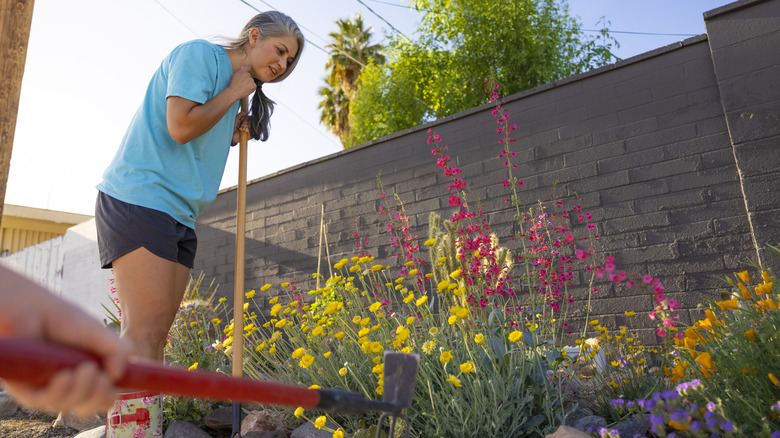The Yard Work Mistake That Is Making Your Seasonal Allergies So Much Worse
The growing season is in full swing, and the trees, grasses, and flowers are lush and lovely. It's time to tackle outdoor chores. While there are tools that will take care of almost every problem in your yard, there isn't one that totally nips seasonal allergies in the bud. If this annual abundance also brings you an abundance of sniffles and sneezes, it definitely takes a bit of the gild off the lilies. Allergic gardeners are no strangers to drugging up with antihistamines and keeping a pack of Kleenex on hand from spring to fall. But there is a way to suffer a bit less while still taking care of nagging yard tasks. Plus, this strategy can save you from a bit of sun and heat.
Growing a healthy garden shouldn't have you sacrificing your own health. Get going on your outdoor to-do list in the early morning, and you'll be the victim of fewer allergens than you would be in the afternoon. Pollen levels peak around noon or a bit later, so the more you can distance your work time from this point, the better chance you have of a more comfortable stint outdoors.
If morning choring doesn't work for you
Not everyone who deals with allergies is blessed with free time in the morning. And some of us just want and need to sleep in a bit on a weekend morning. If yard work before noon isn't likely to happen in your life, you can rely on some more tricks to keep your symptoms at bay.
There are a few other factors that can aggravate allergies at any time of day. Weather conditions can aggravate or alleviate allergies, as well. Wind is an unsurprising contributor that stirs up allergens. Breezes toss particles into the air, preparing them to assault our senses. A bit of rain can have the opposite effect. So if you can't dedicate a chunk of your morning to yard work, avoid doing it in windy conditions, or pick up the rake after a rainfall. Also, if you live in a city, the rise and fall of pollen levels is pushed a bit later,
For severe sufferers, the time of day might make no difference. Instead, you may want to stay out of the garden on certain days. You can monitor current allergen levels with the allergy tracker on Weather.com and with the Zyrtec AllergyCast app.

